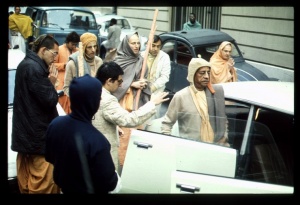CC Madhya 12.20: Difference between revisions
No edit summary |
(Vanibot #0054 edit - transform synonyms into clickable links, which search similar occurrences) |
||
| Line 17: | Line 17: | ||
<div class="synonyms"> | <div class="synonyms"> | ||
''kāṇe mudrā'' | ''[//vanipedia.org/wiki/Special:VaniSearch?s=kāṇe&tab=syno_o&ds=1 kāṇe] [//vanipedia.org/wiki/Special:VaniSearch?s=mudrā&tab=syno_o&ds=1 mudrā]'' — a kind of earring; ''[//vanipedia.org/wiki/Special:VaniSearch?s=la&tab=syno_o&ds=1 la]-[//vanipedia.org/wiki/Special:VaniSearch?s=i’&tab=syno_o&ds=1 i’]'' — taking; ''[//vanipedia.org/wiki/Special:VaniSearch?s=muñi&tab=syno_o&ds=1 muñi]'' — I; ''[//vanipedia.org/wiki/Special:VaniSearch?s=ha&tab=syno_o&ds=1 ha]-[//vanipedia.org/wiki/Special:VaniSearch?s=iba&tab=syno_o&ds=1 iba]'' — shall become; ''[//vanipedia.org/wiki/Special:VaniSearch?s=bhikhārī&tab=syno_o&ds=1 bhikhārī]'' — a beggar; ''[//vanipedia.org/wiki/Special:VaniSearch?s=rājya&tab=syno_o&ds=1 rājya]-[//vanipedia.org/wiki/Special:VaniSearch?s=bhoga&tab=syno_o&ds=1 bhoga]'' — enjoyment of the kingdom; ''[//vanipedia.org/wiki/Special:VaniSearch?s=nahe&tab=syno_o&ds=1 nahe]'' — not; ''[//vanipedia.org/wiki/Special:VaniSearch?s=citte&tab=syno_o&ds=1 citte]'' — in the mind; ''[//vanipedia.org/wiki/Special:VaniSearch?s=vinā&tab=syno_o&ds=1 vinā]'' — without; ''[//vanipedia.org/wiki/Special:VaniSearch?s=gaurahari&tab=syno_o&ds=1 gaurahari]'' — Śrī Caitanya Mahāprabhu. | ||
</div> | </div> | ||
Latest revision as of 21:33, 19 February 2024

A.C. Bhaktivedanta Swami Prabhupada
TEXT 20
- kāṇe mudrā la-i’ muñi ha-iba bhikhārī
- rājya-bhoga nahe citte vinā gaurahari
SYNONYMS
kāṇe mudrā — a kind of earring; la-i’ — taking; muñi — I; ha-iba — shall become; bhikhārī — a beggar; rājya-bhoga — enjoyment of the kingdom; nahe — not; citte — in the mind; vinā — without; gaurahari — Śrī Caitanya Mahāprabhu.
TRANSLATION
Nityānanda Prabhu continued, “The King has decided to become a mendicant and accept the sign of a mendicant by wearing an ivory earring. He does not want to enjoy his kingdom without seeing the lotus feet of Śrī Caitanya Mahāprabhu.”
PURPORT
In India there is still a class of professional mendicants who are very much like the gypsies of Western countries. They know some magical art and mystical processes, and their business is to beg from door to door, sometimes pleading and sometimes threatening. Such mendicants are sometimes called yogīs and sometimes kāṇaphāṭā yogīs. The word kāṇaphāṭā refers to one who has put a hole in his ear to wear an earring made of ivory. Mahārāja Pratāparudra was so depressed by not getting to see Śrī Caitanya Mahāprabhu that he decided to become such a yogī. Ordinary men think that a yogī must have an ivory earring in his ear, but this is not the sign of a real yogī. Mahārāja Pratāparudra also thought that to become a mendicant yogī, one must wear such an earring.